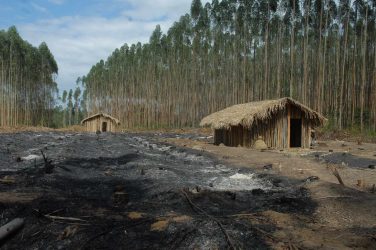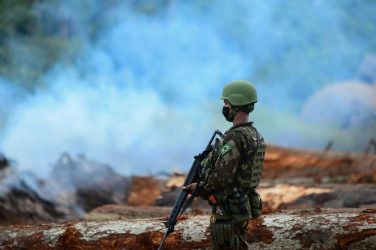Brazilian President Michel Temer has called troops back off the streets of Brasília following their deployment to guard government buildings. At least 49 people were injured in clashes.
The withdrawal of the military came after widespread criticism saying that the move was excessive, amounting to little more than an effort by President Michel Temer to hold onto power amid increasing calls for his resignation.
The measure to deploy 1,500 federal troops to the capital was seen as highly controversial in a country with living memory of more than 20 years of military dictatorship.
In a decree published in the Official Diary, Temer revoked the order issued the previous day, saying that “the halt to acts of destruction and violence and the subsequent reestablishment of law and order” had motivated him to pull back the troops. Soon after, soldiers reportedly began to leave their posts in Brasília.
The mobilization of the military to aid the police was originally intended to remain in effect for at least a week, the government had said earlier.
Clashes
Authorities made eight arrests during confrontations between security forces and protesters in Brasília on Wednesday, while nearly 50 people sustained injuries in some of the most violent scenes yet in a year of political turbulence.
Numerous windows were broken in government buildings in the capital, especially at the Ministry of Agriculture and the Ministry of Culture, and attempted arson was reported at other ministries. Riot police launched tear gas and stun grenades into the crowd.
An estimated 35,000 people descended on Brasília, marching towards the presidential palace in protest. Most of the rally went peacefully; however, small groups of demonstrators wearing masks threw stones at police and smashed their way into government buildings.
The demonstration was called by left-wing groups to protest Temer’s presidency and oppose proposed labor market reforms as well as austerity measures. Demonstrators demand that Temer resign as details about an investigation into corruption allegations against the president continue to emerge.
No Way Out for Temer
Conservative Temer had replaced leftist former-President Dilma Rousseff last year after she was impeached for illegally manipulating government accounts. Rousseff maintained that the charges were fabricated.
However, Temer’s own corruption trial is likely to destroy his political career by all accounts. Last week, Brazilian General Prosecutor, Rodrigo Janot, said he wanted to investigate Temer for corruption and obstruction of justice, passive corruption and criminal organization. The country’s Supreme Court has authorized the probe.
Temer is facing allegations that he endorsed the paying of hush money to a former lawmaker who has been jailed for corruption. Temer denies any kind of wrongdoing.
In addition, several of his advisers have been linked to Brazil’s massive corruption investigation, known as Operation Car Wash.
Chaos
Brazil’s president ordered the military to restore order in the country’s capital Wednesday after some government ministries were evacuated during clashes between police and protesters who are seeking the leader’s ouster.
Tens of thousands of demonstrators marched to Congress to protest economic reforms that President Michel Temer is pushing through and to demand he step down amid a corruption scandal.
Scuffles between police and protesters who tried to jump a cordon mushroomed into a series of clashes in which officers fired tear gas and pepper spray to contain the crowd. Protesters set fires and used portable toilets as barricades.
Local media, including Globo news, captured video images of military police firing pistols into the air. The Secretariat of Public Security later issued a statement saying one person had been injured by a bullet but did not give any information on who fired the shot.
A fire broke out in the Ministry of Agriculture, and demonstrators smashed windows and doors at other ministries. Some government agencies were evacuated in response, the president’s office said.
In a brief national address during the unrest, Defense Minister Raul Jungmann said troops were being sent to guard federal buildings, including the presidential palace.
The weeklong deployment was authorized by a presidential decree, which left open the possibility that soldiers could be used more widely in Brasília. The decree said Jungmann would decide the scope.
“This mess, this mayhem is unacceptable,” Jungmann said. “President Temer will not allow that.” Jungmann added that soldiers had entered the Foreign Ministry, and televised images showed troops outside the presidential palace.
Temer is struggling to retain power after the release of a recording that appears to capture him approving hush money for a convicted former lawmaker. Brazil’s top court is investigating him for alleged obstruction of justice and involvement in passive corruption. The president has denied wrongdoing and said he will not resign.
His unusual decision to call in the military heightened anger against the government being seen as the last gasp of a president trying to maintain his hold on power.
“This decree was never used in this context to protect an administration that is politically isolated,” said Newton de Oliveira, a professor and security specialist at Mackenzie University in Rio de Janeiro. He said he thought the supreme court might be called on to evaluate whether the move was constitutional.
Late Wednesday, Temer’s office issued a statement saying the move was necessary after violence had put the lives and safety of public servants at risk. It said the president had determined that using the country’s National Force, an elite police entity, would not have been sufficient. He also denied the move was unusual, it said.
“When order is re-established, the decree will be revoked,” the statement said. “The president of the republic underscores that he will not hesitate to exercise the authority given to his office whenever it is necessary.”
Many Brazilians already see Temer as illegitimate because he came to office after his predecessor, Dilma Rousseff, was impeached and removed.
His popularly plummeted once he began governing as he tried to pass economic changes meant to jump-start the economy, which is in the deepest recession in a century. A series of corruption allegations that have swirled around him and his administration also disillusioned voters.
Now, with the latest allegations against Temer himself, many Brazilians have had enough. In the wake of the announcement on the use of the military, senior officials began distancing themselves from the decision.
“If this government cannot hold itself up, the armed forces will not hold up this government,” said Sen. Renan Calheiros, who is the whip for Temer’s party in the upper house but has increasingly challenged the president.
Rodrigo Maia, the speaker of the lower house of Congress, who had asked Temer to instead use the National Force, called the move “an excess” and said he hoped it wouldn’t last longer than a day.
The pressure on Temer to resign continued to ratchet up. Federal police asked the president to submit to questioning, his defense team said in a statement, but a supreme court justice later determined the police did not have the right to do that.
Temer also lost yet another aide when Sandro Mabel resigned Wednesday, saying he needs to spend more time with his family. He is the latest in a string of aides and allies who have resigned or been fired amid corruption allegations.
With Brazil deeply divided and a political crisis deepening, a session of the lower house of Congress became chaotic, with opposition politicians surrounding the speaker’s desk in protest and holding signs saying Congress’ workings should be transparent. The Senate’s session also descended into chaos.
While Congress debated, 35,000 people were marching toward the chamber down a long avenue lined with the main government buildings, including the Supreme Court, the presidential palace and the ministries.
Protesters shouted “Out with Temer!” and carried signs calling for immediate direct presidential elections.
If Temer resigned, the Constitution says Congress would elect the next president, who would hold power for the rest of his term, which runs to the end of 2018. But many Brazilians, disgusted with the political class, want a snap election.
DW/MP













